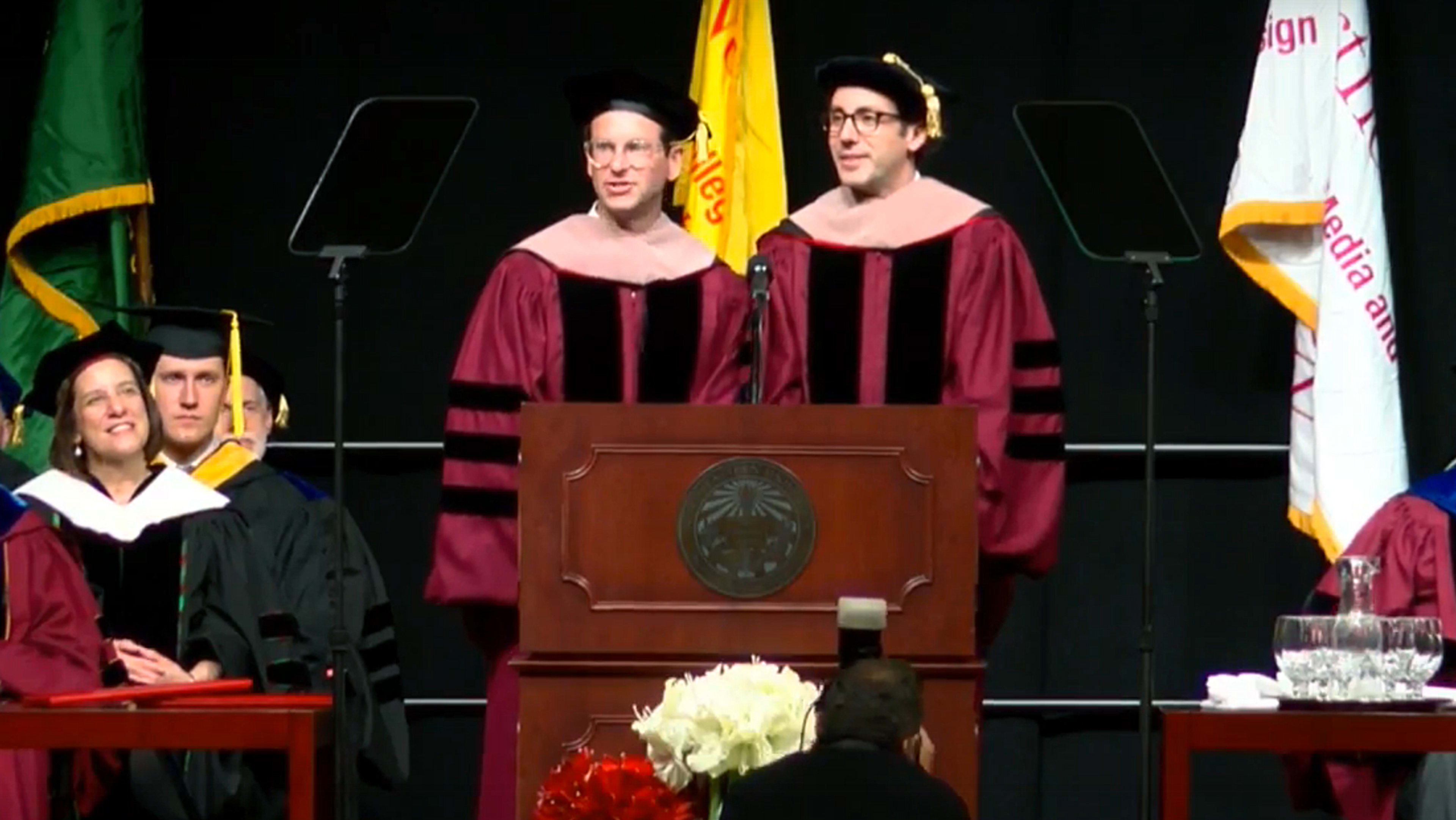Before Neil Blumenthal and Dave Gilboa started Warby Parker with their fellow cofounders Jeff Raider and Andy Hunt, they felt the way a lot of new grads do: extremely well-educated in a narrow range of really specific things.
“Three of us had management consulting and finance backgrounds, and the other came from a nonprofit,” Gilboa told Northeastern University’s graduate-degree recipients in a commencement address with Blumenthal earlier this month. “If you wanted a team to build a fancy Excel model or put together a slick PowerPoint presentation, we were your guys. If you wanted to create an A-team to disrupt the $100-billion optical industry, we were most certainly not it.”
Highly specialized skills can feel like an albatross when you’re just entering the workforce, especially right now, when so many recent grads are taking jobs for which they’re overqualified. But as Gilboa and Blumenthal see it, it wasn’t the details of their education that secured Warby Parker’s success. Looking back, they’ve learned a few lessons that might go farther than any MBA or technical degree can take you–particularly in fields you’re totally unfamiliar with.
Here are three of them in Blumenthal and Gilboa’s own words, excerpted from their Northeastern address and lightly edited.
1. Presume Positive Intent
Neil Blumenthal: It’s human nature to assume the worst. Avoid doing so. Have enough confidence in yourself that when someone suggests a new idea or takes action without telling you first, don’t get defensive. You can’t gain trust if you don’t give it away first. This doesn’t mean that you shouldn’t be skeptical at times–but trust first, then verify. If you can’t presume positive intent, then you’re hanging out with the wrong crowd.
Dave Gilboa: Our lack of industry experience made us joyfully naive. It enabled us to get excited about an opportunity without being scared off by its complexity. Our lack of knowledge fostered a beginner’s mind-set that forced us to ask basic questions about every aspect of our business: How can we dramatically bring down the price of glasses? Are there nontraditional ways we can enable customers to try on our frames? How many lens options do we need?
While industry insiders scoffed, every day we learned more, got smarter and applied that learning. But you don’t need to start a business or work at a startup to be entrepreneurial. You just need to commit to getting better every day.
2. Speed-Walk, Don’t Cliff-Dive
NB: Instead of dropping out of school to pursue [our startup] idea, we used our time in graduate school to systematically de-risk every element of the business. We spent a year and a half putting together a brand architecture, building a business plan, coming up with a name, and determining at what price we should sell our product. In fact, one of our professors refused to invest in our business because he thought if we were truly committed we would have dropped out.
But committing to something doesn’t mean jumping out of a plane without a parachute.
Speed-walking is constantly moving forward by taking deliberate step after deliberate step. You’re moving quickly but never feel out of control. You can speed-walk a lot longer than you can run. We’ve found that you’re more likely to get to your destination if you dream big but fail small. You came here with big ambitions, and now you graduate with an obligation to fulfill them. Any journey worth taking will involve a million scary decisions.
Conquer fear by minimizing risk, not eliminating it. Take baby steps rather than giant leaps. If you feel like you’re standing at the edge of a cliff, take a step back and break that decision down into a handful of smaller decisions. Those smaller steps and decisions might enable you to find a different path down the mountain.
Related: Setting Big Goals Might Be Preventing You From Actually Achieving Anything
3. Treat Others The Way They Want To Be Treated
DG: Whatever path you take, you will encounter people of all different backgrounds and life experiences. Our entrepreneurial journey, and truly all journeys, are enriched through exposure to a variety of perspectives, some familiar and some new. Seek to understand different points of view and preferences. This is one of our core values at Warby Parker. Initially it was treat others the way we wanted to be treated.
But people are complex and different, and it’s much more powerful to be empathetic, truly understanding the individual you’re interacting with in order to cater to their wants and needs. Practice empathy and be grateful.
NB: The beauty of kindness is that it is both a means and an end. Our success is entirely the result of the goodwill of our classmates, professors, and former coworkers who encouraged us while providing critical feedback and introductions. Kindness enables success while being the success we seek: a kind world. Let us all be proliferators of kindness.
DG: We have a quote on the wall in our office by the novelist Henry James: “Three things in human life are important: the first is to be kind; the second is to be kind; and the third is to be kind.”
If you’re not sure where to begin, start with a simple question. Ask yourself, “What can I do to make someone’s life better?” In our case, the answer was as simple as bringing down the price of a pair of glasses. But you will each find your own answer to this question.
That’s where things get interesting.
Recognize your brand’s excellence by applying to this year’s Brands That Matter Awards before the early-rate deadline, May 3.
